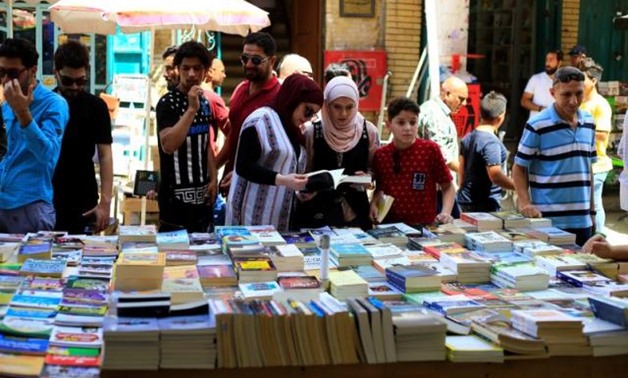
Iraqi women shop for books at Mutanabi Street in Baghdad, June 22, 2018. Picture taken June 22, 2018. REUTERS/Thaier al-Sudani.
BAGHDAD (Reuters) - When Maher Abu Hissam started his Baghdad bookshop two decades ago he was selling up to 40 books a day, such was the hunger for literature in the days of Saddam Hussein, even though the regime banned anything it did not like.
Censorship was lifted when a U.S.-led invasion toppled Saddam in 2003 but far from an upturn in sales these days Hissam sometimes sells just a few books at his shop on Mutanabbi Street.
The street on the banks of the River Tigris where dozens of booksellers have shops and traders used to ply books from trolleys is in some ways a symbol of the city’s shifting fortunes.
Since 2003, the market has seen a boom in new shops, books and publishers. It even recovered from a bomb attack in 2007 that killed around 30 people.
Filmmakers, musicians and painters flock there on Fridays, gathering at the market near a statue of Mutanabbi, a 10th century poet.
Baghdad’s security has improved since a sectarian war in 2006-2007 but many people have more pressing needs than books. Surviving economic hardship and inflation caused by Iraq’s loss of oil revenue and procuring fuel for generators are higher priorities.
“In 2003, business was booming. New book shops sprang up and books from abroad arrived,” said Hissam, sitting in his one-room shop amid books about politics, religion and academic subjects.
“Now people have no time to buy books,” he said.
In addition, higher customs duties to offset lower oil revenues has raised the cost of book imports and uncertainty following elections in May has hurt business, booksellers said.
“The number of people buying is not the same as before the election,” said bookseller Ahmed Hawi Ismail.
ADDICTED TO FICTION
Mutanabbi Street has for decades been a center of Iraq’s intellectual life. The city’s literary tradition is summed up in the saying: “Cairo writes. Beirut prints. Baghdad reads.”
Because online book-buying is almost unheard of in Iraq, people browse for hours in bookshops or arrive with handwritten notes of titles they want.
Iraqi publishers pump out new books but street vendors also sell everything from guide books for the Baghdad museum that was looted in 2003, communist propaganda from East Germany from the 80s and picture books showing Iraq’s better days in the 70s.
“Demand for fiction is high,” said Abdul Sattar Jabr, a professor at al-Mustansiriya University, after buying an old Russian history book in Arabic. He said more than 1,200 Iraqi novels have been published since 2003.
Slideshow (3 Images)
Yet the profile of readers is changing. On two visits the book market was mainly frequented by older readers. Young book buyers were often students preparing for seminars.
“The older generation of Iraqis is dying. Young people are more interested in smartphones and the internet,” said Adnan Mansour, a 75-year-old retired human resources manager who has come to the market since 1959.
Over tea at the well-known Shabandar Cafe he recalled days when sellers ventured out with trolleys full of books. He has collected some 6,000 books, filling even his bedroom. This time he bought six academic books on religion.
Hissam, his favorite seller, said he would stay in business even if he makes a loss.
“It’s not good business these days but I simply love books,” he said.


Comments
Leave a Comment